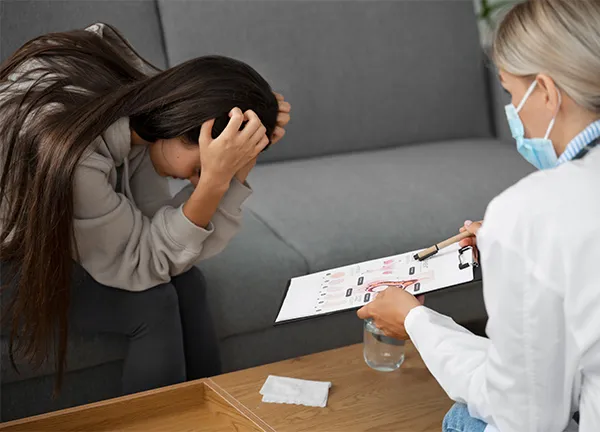PTSD Counselling in Edmonton That Helps You Heal
Post-Traumatic Stress Disorder can affect every part of your life—but it doesn’t have to define you. Our Edmonton therapists provide trauma-informed support to help you manage symptoms and move forward.
- Therapy for PTSD related to accidents, violence, or loss
- Learn coping tools to reduce flashbacks, anxiety, and hypervigilance
- Online or in-person therapy with experienced professionals
Post Traumatic Stress Disorder Counselling
Many people may experience Post-Traumatic Stress Disorder (PTSD) after going through a horrible event. It causes various challenges in daily life. Some individuals experience anxiety or find it tough to remain close to their loved ones. Sometimes, the trauma’s memories come back, making it difficult to fall asleep. Many people with post-traumatic stress disorder have found relief in therapy and treatment. It makes sense to seek assistance if you are having these problems. You can take back control of your life and progress toward recovery through treatment. Consider the way to a better future without fear.

Understanding PTSD
A tragic occurrence may cause someone to experience post-traumatic stress disorder. Realizing that PTSD is a reasonable response to a terrible circumstance and not an indication of weakness is crucial. Numerous challenges can arise in a person’s daily life if they have PTSD.
People who have PTSD may frequently feel on edge, in danger, or have trouble trusting others. Their thoughts and even their sleep may be disturbed by intrusive and upsetting recollections of the traumatic experience. It’s typical for people to avoid situations, people, or activities that bring up their trauma. It may be difficult to maintain relationships, hold down a career, or simply enjoy life if you have these symptoms.
Post traumatic stress counselling, grief & loss counselling, and therapy can be useful treatments for PTSD. Our team is here to offer the guidance, comprehension, and methods required to deal with and ultimately overcome these difficulties. We provide a secure setting where one can recover, reclaim control, and advance toward a better future.
Bharat Sharma, Therapist
Bharat Sharma is a dedicated and knowledgeable therapist at Edmonton Counselling Services in Edmonton who focuses in treating severe Post-Traumatic Stress Disorder (PTSD). He is committed to helping individuals overcome the challenges caused by PTSD by employing a compassionate and perceptive approach.
Bharat Sharma has extensive industry knowledge and a keen understanding of the issues related to PTSD. He firmly believes that therapy may help people who are dealing with this problem alter their lives for the better. In order to communicate their fears, experiences, and feelings, he offers his clients a safe and accepting environment.
Numerous people have found relief from the burden of PTSD because of Bharat Sharma’s kind and knowledgeable consultant. Bharat Sharma is here to support you on the road to recovery and a better future if you’re looking for a qualified therapist to aid you on your path to healing.


Our Therapist And His Role For PTSD Patients
In order to heal and recover from PTSD, people need the assistance of a therapist. Our expert acts as a companion as you traverse the difficulties of complex post-traumatic stress disorder.
Our expert is a licensed counselor who offers a secure and encouraging environment so that you can discuss your experiences, anxieties, and feelings. They give you helpful advice and listen without passing judgment as you attempt to manage your PTSD symptoms. You can better understand your trauma and how it has affected your life by seeking post traumatic counselling.
To meet each person’s specific needs, our specialist employs a variety of strategies, including Cognitive-Behavioral Therapy (CBT), exposure therapy, and more. The therapist can support you in bettering your relationships while managing intrusive thoughts, worry, and stress.
Therapy involves more than just talking; it also involves giving you the skills you need to take back control of your life and stop suffering from your past. Our therapist is here to accompany you each step of the way if you are on the road to recovery from PTSD.
What Symptoms Indicate Post Traumatic Stress Disorder?
Several symptoms of post-traumatic stress disorder may have an impact on your life. It is crucial to notice these symptoms because PTSD may be present.
Intense, upsetting recollections of the traumatic incident frequently plague people with PTSD and can recur at any time. They might experience flashbacks where they feel like they are reliving the tragedy, have nightmares, or have difficulties sleeping.
You may feel on edge all the time if you have PTSD, which makes it difficult to unwind or concentrate. You can start acting jittery or easily scared or even avoid situations, people, or objects that bring up unpleasant memories.
With post traumatic stress disorder treatment, mood, and thought changes are also frequent. You might feel guilty, hold yourself accountable, or lose interest in past interests. Some people even experience a sense of emotional numbness or separation from others.
It is crucial to seek our experienced therapist’s assistance if you or someone you know is going through these symptoms. In order to control these symptoms and advance toward healing and recovery, our specialist in Edmonton can offer support, direction, and practical techniques. Take that crucial move towards a better future without holding back.


How Expert Therapy Can Help You in Treating PTSD?
Of course, the following list of examples illustrates how professional counseling can help alleviate the signs of PTSD:
Understanding And Coping: To help you cope with the symptoms of PTSD, our skilled therapist offers you useful coping techniques.
Making A Safe Space: Therapy gives you a place where you may talk about your experiences, anxieties, and feelings without being judged.
Customized Treatment Plans: To ensure a personalized approach, the therapist adapts treatment plans to your particular requirements and experiences.
Addressing Intrusive Thoughts: Therapy teaches you how to control the frequent nightmares, flashbacks, and intrusive thoughts that come with PTSD.
Reducing Anxiety: To assist you in regaining a sense of peace, our therapist offers ways to lower tension, anxiety, and hypervigilance.
Enhancing Interactions: Therapy sessions may concentrate on improving your social skills and reestablishing your bonds with loved ones.
Overcoming Guilt And Self-Blame: Professional advice can help with PTSD-related feelings of guilt and self-blame.
Restoring Joy: Even when PTSD has caused you to lose interest in previously enjoyable pursuits, therapy can help you rediscover them.
Emotional Recovery: Your therapist will work on a post traumatic counselling process to get you in touch with your feelings and get over emotional numbness.
In the process of post traumatic stress disorder treatment, professional therapy is a vital tool. Our qualified and experienced therapist is here to help and guide you toward a better future if you or someone you love is suffering from PTSD symptoms.
Getting Started: Your First Steps to Healing
Contact Us: Calling on our team is the initial step. To make an appointment or to ask any questions you may have about complex post-traumatic stress disorder counseling, please contact us by phone or email.
Initial Consultation: We will arrange a first appointment for you to speak with our skilled therapist. You can talk about your experiences and worries in this private, protected environment.
Assessment: Our therapist will evaluate your needs, symptoms, and objectives during the consultation and will collaborate with you to comprehend your particular circumstance.
Personalized Treatment Plan: Your therapist will develop a customized treatment plan just for you based on the exam. The measures necessary to assist you on your road to recovery are outlined in this plan.
Starting Therapy: You will start therapy sessions that fit your schedule and preferences once your plan is in place. At every step of the journey, your therapist will be there for you.
Healing and Recovery: You’ll begin the path of healing, empowerment, and PTSD recovery through professional treatment and post traumatic stress disorder counseling. We’re here to lead you down this road and direct you toward a more promising future.
It takes strength and bravery to decide to start the process of PTSD recovery. As you start this journey, our staff is here to offer you the support and direction you require.


